In a recent article about the Tour de Trossachs I became side-tracked onto the year 1978 and mentioned, amongst other things, the Scottish Milk Race – back when Scotland had a National Stage Race, and for quite a few years before and after.
Here I have a look at a few editions of the Milk Race and the Scottish Health Race, where Scotland managed to have a home win with Jamie McGahan in 1983.
Now before I start, please remember this is not a chronological history of Scottish stage races, it’s just a simple ramble down memory lane – and I do know that there exists other great races such as: the Girvan in Ayrshire and the sadly-missed Tour of Speyside in Invernesshire and the Tour of the Kingdom in Fife, but these races weren’t / aren’t classed as “National”.
In any case,: if you want to email in and point out inaccuracies or omissions as you see them, please do, but I’m not going to let ignorance or forgetfulness get in the way of a good reminisce!
* * *
The Scottish Milk Race
The Milk race started in 1963 as a single day race, not that I would remember because I was only 4 years old at the time.
It soon became an important international amateur stage race, on occasions up to seven days duration and eventually, before its demise, it became a Pro-Am stage race, providing a much needed stage race for the British pro’s and good experience for home amateur talent.
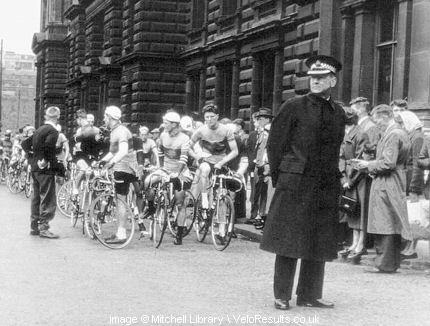
* * *
1971
That was all to come, let’s start with the first Scottish Milk Race that I remember in 1971. This was a race of rain, bad luck and came down to two men, Frenchman Claude Aiguesparses and English rider, John Clewarth.
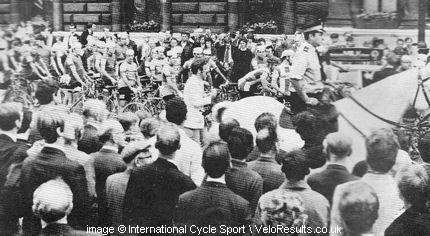
The race didn’t look like it would be a classic edition as the Belgian team had withdrawn leaving only France, Holland, Italy and Luxembourg to represent continental countries, to make up the numbers there was six “Home Nation” teams: Scotland A and B; England A and B; Ireland and Wales.
The continental teams were really sponsored clubs and the French star Claude Aiguesparses rode for CSM Puteaux – this was the team that Billy Bilsland had cut his teeth on before turning professional. Aiguesparses had been second in that year Route de France behind Regis Ovion and was third in the French National champ, so he was the possible favorite, if his luck had held out.
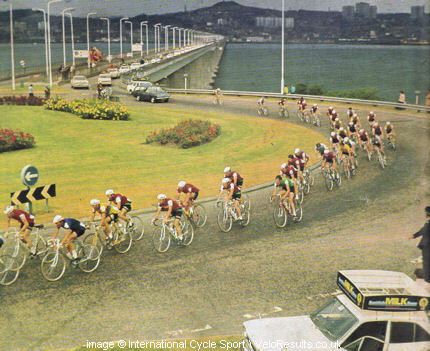
The first stage from Glasgow to Arbroath ended in a bunch sprint, but earlier in the stage Clewarth had shown his hand early by crossing to handy looking break including a young (yes he was once!) Sandy Gilchrist, Irishman strongman Peter Doyle and English riders Dailey Dutton and Clarke, this bold attempt failed but it showed who was going to be doing the racing and Clewarth was definitely one of them, Doyle won the stage and took the first yellow jersey.
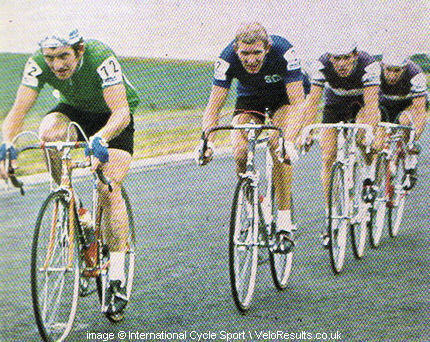
Stage two saw a lots of splits on the roads from Arbroath to Leven, the important one that fought out the sprint included two Scottish riders, Gilchrist again and Scottish B.A.R. Dennis Mitchell. This group of ten also included Leader, Doyle, Clewarth and Frenchman Corbeau, the sprint was won by Kevin Apter of the English B team as the other Frenchman, Aiguesparses came in 25 seconds later, this was to prove important later.
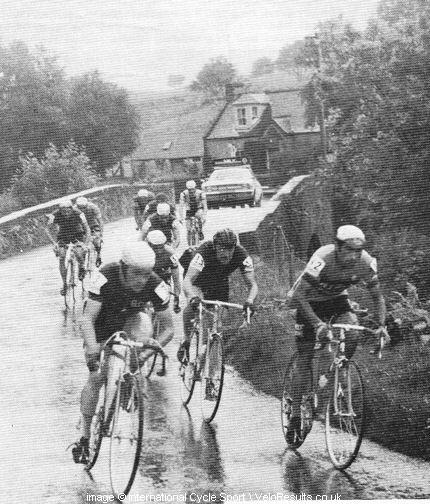
Bad weather was to shape stage three from Dunfermline to Dunbar. Yesterdays winner, Apter was level on time with Doyle (but behind on points) and needed to break the Irishman.
He managed to get away at 35 miles out with two English “A” men, Dutton and Thomas, Frenchman Corbeau and Van Dongen from Holland, these six were chasing a group with Daily and Aiguesparses.
It was all to go wrong for Apter on the climb out of Gorebridge (now home of Alex Coutts who wasn’t even born then); his chain came off as Van Dongen split the chasers. Up front Aiguesparses was making his move with Daily as a passenger. Daily won the stage after a mix up on the run in to Dunbar, but Aiguesparses took the yellow jersey and looked strong enough to keep it.
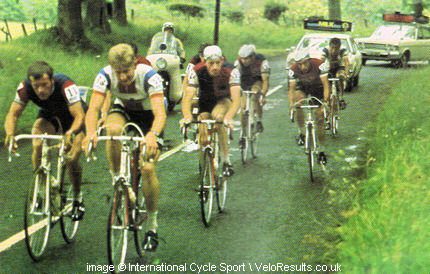
Nothing much happened on stage four from Haddington to Dumfries, the Frenchman Richard won a two-up sprint from Holland’s Groen, the pair had a lead of five minutes at one point but the Aiguesparses and Corbeau showed how they had won the French team time trail buy pulling them back to 11 second by Dumfries.
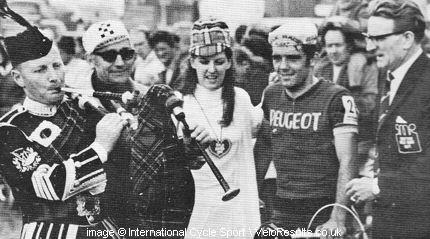
The last stage was the one that luck came into play, bad luck for Aiguesparses and good luck for Clewarth. Scottish rain played a very BIG part in the Frenchman losing what looked like a safe overall win.
It was a day of attacks through the heavy rain; the main riders on overall were away battling it out; Corbeau, Aiguesparses, Clewarth, Apter, Dailey, and Doyle, along with Scotland’s Dennis Mitchell and any other hardy souls.
With 10 miles to go to the finish in Ayr, Clewarth attacked and Aiguesparses jumped on his wheel. At this the Englishman eased and Holland’s Vanvenrooy attacked and Aiguesparses followed him, but they both crashed on a sharp corner.
The Dutchman was up and away but Aiguesparses wasn’t as lucky as his bike was wrecked and he had to wait for his spare. Things were made worse by two Italians crashing into him as he waited.
Vanvenrooy went on to win the stage and Clewarth stayed with Doyle to take the overall win, Aiguesparses lost nearly a minute and a half and was 37 seconds down on Clewarth by the finish. The Frenchman was wet, had torn shorts, was despondent and in tears – he had lost it all on a rain soaked Ayrshire bend.
The other big loser was Apter, he punctured early and never saw the break again. He had started the stage in third overall and had he finished in that position he would have got a 50 pound prize, but finishing 12th he received :£3!
It was one hell of a race, but sad to think that Britain’s best were shown how to race by some club teams.
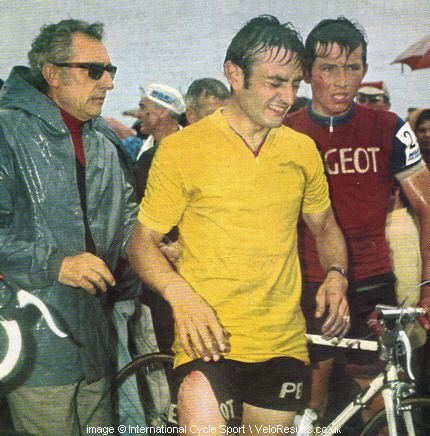
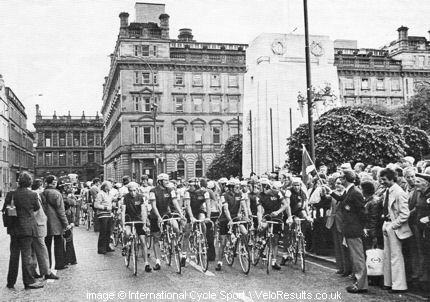
* * *
1976
We will jump ahead to 1976 as this was the last year of the all amateur race, but then it was so dominated by the East Europeans that a change was needed. In 1975 the Polish team with Ryszard Szurkowski completely dominated, but in 1976 they nearly got it all their own way.
The 1976 Scottish Milk Race was not a classic version, it actually bordered on boring, during the first stage from Glasgow to Leven a break of nine went up the road never to be seen again and the overall was fought out between them.
In that group was Scotland’s only representative, Sandy Gilchrist, and proved to be the only home rider to make the grade against this strong International competition.
On the Crow Road in to the Campsies, Robert Melrose (Scotland) was unlucky enough to puncture, he got together with the dropped Alan Beveridge (Young Scotland) and two crashed riders, and they were to chase all the way to Leven.
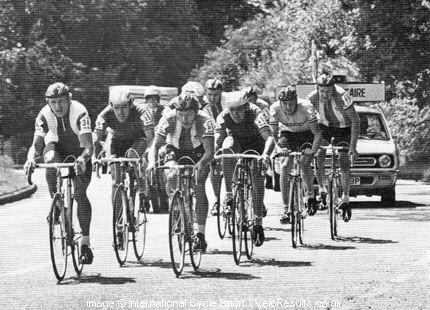
The lead group’s gap grew and grew and by Stirling (57 miles) they had six minutes fifty seconds. The strongman group included; Jiri Bartolsic and Ludek Kubias (Czech), Graham Harrison (Manchester), Roy Taylor and Bob Downs (GB), Sandy Gilchrist (Scotland), Jan Synowiecki and B. Eben (Poland) and Ronnie Dillen of Belgium.
These nine riders came in to Leven nearly thirteen minutes ahead of a Paul Sherwen lead bunch. Bartolsic won the stage and took the Yellow jersey to look after for his team mate, Kubias who was second on the stage and was to take the lead and keep it to the finish of the race in Dunbar.
Second stage was from Dundee to Aberdeen, the stage finished down at the Beach Promenade and was won by Piet Van Kollenburg of Holland from New Zealander, Paul Jesson. This wasn’t important to the overall as neither were in that original break.
The next day saw some home riders in the fray, first Drew Robertson (Young Scotland) and John (Clanky) Clark (Scotland). Sadly John is no longer with us, but he was a real character – a survivor of childhood Polio and a stalwart of the Ivy C.C. On a personal note I learnt more from John about track riding in an hour riding round Medowbank than I had in the two previous years pretending to be a trackman.
After the climb of Cairn o’ Mount, Clark was in a very handy break with Sherwen and Pownall (GB), Ruzark Wawrzuta (Poland), Scheuneman (Holland), Benny Van Auwera (Belgium) and more importantly Ludek Kubias (Czech) and Ronnie Dillen (Belgium) from the first stage were also in the group, when the lead was at 2 minutes they were the new first and second places on overall classification, chasing them was a young Irishman by the name of Pat McQuaid, he never made it across, but he has gone on to other things since.
Kubias took stage and yellow honors and now his only worry was the young 19 year old Belgian, Dillen, who was at one minute and fourteen seconds, the race for overall was over for everyone else.
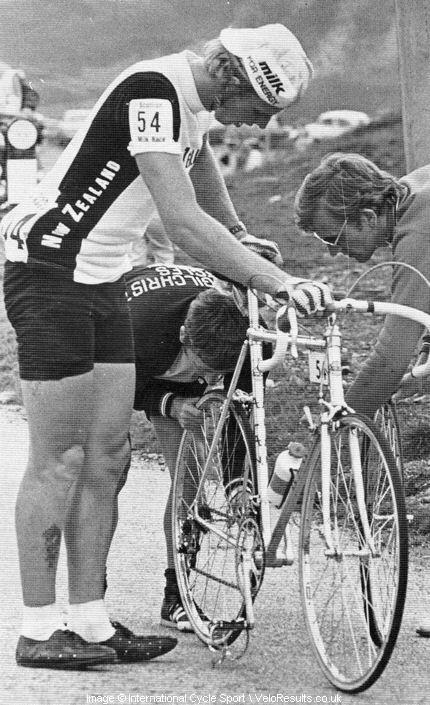
One of the crash victims from stage one got himself into a bit of trouble later in the race, on the stage from Pitlochry to Dunfermline. Jack Swart from New Zealand took a lift in a car to save himself an uphill ride to the start proper after a 10 mile neutralized zone, he was first disqualified and then reinstated with a five minute penalty, which wasn’t so important as he was already over an hour down! Another happening was the loss of a Polish team member while on a shopping trip in Aberdeen, he eventually turned up in the tourist information office lost and confused.
The rest of the race was a battle between the teams of Czechoslovakia and Great Britain for the overall team prize. Kubias won the next stage in to Dunfermline to defend his yellow jersey.
On the last stage across the Forth Bridge the riders passed on unhindered, not the race vehicles: they had to pay, ah! East Coast generosity!
Just before the bridge, Scotsman Graeme Nisbet got away with Bob Downs (G.B.) and Hrezdira (Czech), and they were joined by another group including danger men from the first day’s break, Gilchrist and Dillen, so it wasn’t long before the yellow jersey wearing Kubias appeared too, this in effect taking the sting out of the lead group and it all came together.
Over the Lothian Hills Hrezdira, who had stayed away, was joined by two Dutchmen, Prinsen and Scheuneman, and these three fought out the sprint in front of an enormous crowd in Dunbar with Scheuneman taking honors.
Ludek Kubias won the last amateur Scottish Milk Race and Great Britain took the team prize. It wasn’t a great race for the Scottish teams, but Sandy Gilchrist showed again that he was the only home rider that could mix it with the best, which was to soon change with riders like Millar and McGahan on the way up.
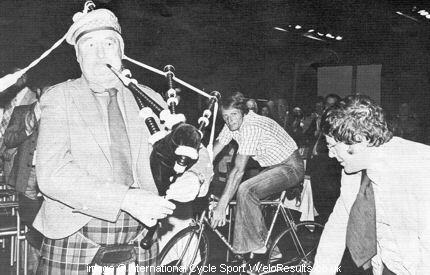
In Part 2 we will look at the first Pro-Am Scottish Milk Races of 1977 and ’78 – classic stuff!



